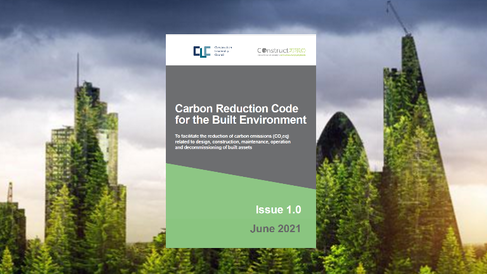
Today, 15 June 2021, Issue 1.0 of the Carbon Reduction Code for the Built Environment has been published on the Cambridge Centre for Smart Infrastructure and Construction (CSIC) website.
The Carbon Reduction Code for the Built Environment has been developed on behalf of the Construction Leadership Council (CLC) and is part of the Council’s Construct Zero initiative. The Code has been developed by the Achieving Net Zero Cross-Industry Working Group convened by CSIC. It is a first step to facilitate action towards reducing carbon emissions (CO2eq) related to design, construction, maintenance and operation of built assets.
Leading sustainability experts, industry and government representatives will be speaking at the online launch of the Carbon Reduction Code for the Built Environment, hosted by the Cambridge Centre for Smart Infrastructure and Construction (CSIC), at the University of Cambridge, on 17 June.
It is essential that our industry reduces carbon emissions and the more organisations that sign up to the Code, the more we will achieve. Carbon reduction is much more likely to happen when all organisations within a value chain are committed to working together to reduce their footprint and save costs. Collaboration is the key to success, and with alignment across all parties we can progress towards the net zero carbon objective at the pace required Dr Jennifer Schooling, Director CSIC
The launch event will be introduced by Hannah Vickers, CEO, Association for Consultancy and Engineering (ACE), and Jennifer Schooling OBE, Director of CSIC, and will include short presentations by the organisations which are currently conducting trials of the Code including: James Wilcox, representing the National Association of Construction Frameworks (NACF); Kat Ibbotson, Net Zero Carbon Infrastructure Programme Manager at the Environment Agency; and Chris Hayes, Sustainability Operations Director, Skanska UK. Feedback from the trials, which are being conducted across different organisational scales, have helped to shape the development of the Code, which is broad in intent and designed for participating organisations to share experience and learn from each other.
“It is essential that our industry reduces carbon emissions and the more organisations that sign up to the Code, the more we will achieve. Carbon reduction is much more likely to happen when all organisations within a value chain are committed to working together to reduce their footprint and save costs,” said Dr Jennifer Schooling, Director of CSIC. “Collaboration is the key to success, and with alignment across all parties we can progress towards the net zero carbon objective at the pace required. There are already many excellent examples of carbon reduction measures among our Achieving NetZero Cross-Industry Working Group and the Code builds upon these strengths to provide an encouraging, supportive and collaborative approach to reducing carbon.”
The launch event will feature short reflections on the trial and the Carbon Reduction Code given by Peter Yates, Regional Frameworks Director, Constructing West Midlands and Vice Chair, NACF; Charmaine Hughes, Programme Manager and Head of Frameworks (NWCH), Manchester City Council; and Fergus Harradence, Deputy Director, Construction, Department for Business, Energy & Industrial Strategy (BEIS). The hour-long launch event, which is free to register and open to all, will conclude with a Q&A with the speakers.
Background
The Achieving Net Zero Cross-Industry Working Group was formed in March 2020 to explore challenging yet practical ways to move the infrastructure and wider construction industry towards meeting the UK’s goal of net zero carbon emissions by 2050. Currently the Working Group comprises more than 40 representatives from a diverse range of consultants, contractors, industry groups and local and central government, including: Department for Business, Energy & Industrial Strategy; Infrastructure and Projects Authority; Environment Agency; Highways England; Skanska UK; and the National Association of Construction Frameworks (NACF). Read more about the Carbon Reduction Code for the Built Environment here.
Following this soft launch, organisations are encouraged to get involved and sign up to committing to the code. The Carbon Reduction Code for the Built Environment will then be formally launched in the autumn to coincide with the UK hosting the 2021 United Nations Climate Change Conference at COP26.
• Register to join us on from 1-2pm on 17 June for the launch of the Carbon Reduction Code for the Built Environment.
Event registration and programme.
• Read the news story announcing the launch of the Draft Carbon Reduction Code for the Built Environment.
• For on-the-day registrations (before 12 noon), further details and media requests please contact: csic-comms@eng.cam.ac.uk
Note for Editors
- The Centre for Smart Infrastructure and Construction (CSIC) hosted an ‘Achieving Net Zero’ roundtable event in March 2020, organised by Dr Jennifer Schooling OBE (CSIC), Dee Dee Frawley (CSIC), Janet Greenwood (KPMG) and Dr Keith Bowers (COWI). This event led to the formation of the Achieving Net Zero Cross-Industry Working Group to develop the Carbon Reduction Code for the Built Environment.
- The ‘Achieving Net Zero’ event followed on from an earlier CSIC roundtable, held during the 2018 Global Engineering Conference at the Institution of Civil Engineers in London, which explored how engineers can engage with the challenges of mitigating and responding to climate change. This event resulted in the CSIC paper ‘Smart Sustainability: Exploiting data in engineering to mitigate climate change’.
Related link:https://wwwsmartinfrastructure.eng.cam.ac.uk/system/files/documents/smartsustainability.pdf
